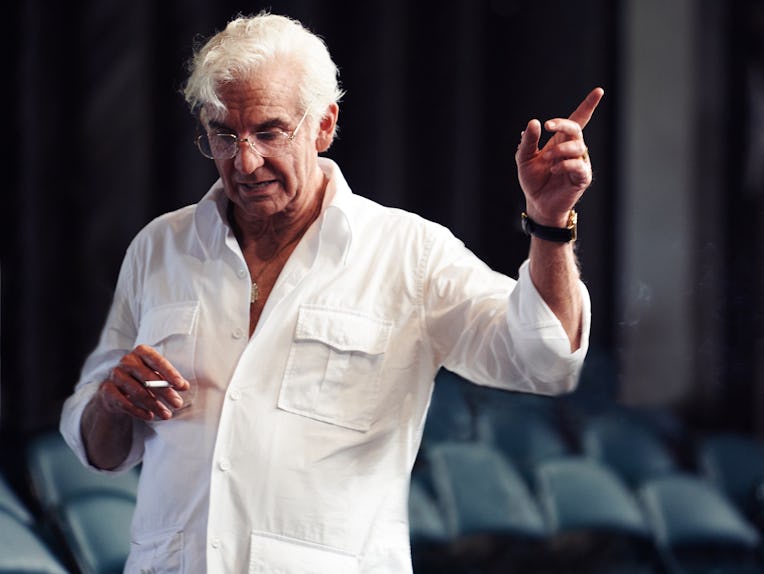In the coming months you may see a man who looks like this.
You might think to yourself, is that deceased bisexual American composer and conductor Leonard Bernstein? More specifically, you might think, is that actor-slash-director Bradley Cooper in old-age Leonard Bernstein prosthetics by makeup artist Kazu Hiro who is perhaps vying for his third Oscar after previously taking home wins for The Darkest Hour and Bombshell?
If you did think that, you are on the right track: That is neither Cooper nor Bernstein, but Cooper-as-Bernstein in the actor-slash-director’s second film, a.k.a. Maestro from Maestro. I’m no forecaster, but the winds are lively and the timing is right. I’m telling you: Invest in Maestro now. Buy buy buy!
Pick your angle. There’s no bad one. That Cooper’s directorial debut A Star is Born was not only artistically but commercially successful — featuring at least three great songs and a dazzling number of memes, to boot — was one of the biggest surprises of 2019. We can credit him for awakening the dormant Oscar yearning in Lady Gaga, leading to the House of Gucci press tour. Cooper should’ve won the Best Actor Oscar that year, but he lost to public enemy Rami Malek and the power of fake teeth and a bad wig. Gary Oldman, too, won his Oscar in prosthetics. Even Will Smith wore prosthetics in King Richard. So Cooper wants it, and he wants it badly, to the extent that he has given himself a new ancestral nose and everything just for this film.
There’s also the Jake Gyllenhaal factor. You might be wondering: Shouldn’t a more Jewish-looking guy be playing Maestro? A slightly more Jewish-looking guy almost did play Maestro, but Gyllenhaal lost to Cooper for access to the Bernstein estate rights. Which meant that maybe Gyllenhaal could have been Maestro, but what is Maestro without the music of Maestro? Both Cooper and Gyllenhaal are perfectly lauded but under-rewarded, both known for their guarded intensity, which begs the question of whether the battle for classical music rights will perhaps spawn a sort of modern-day Amadeus thing between the two of them.
There’s also the matter of the supporting cast. Perhaps this is the kind of film that Carey Mulligan stans (Mulli-stans? The community is in a building season) and the Jeremy Strong army (or whoever it was that sent hate mail to The New Yorker for accurately profiling an extremely weird guy) will latch onto, but time will tell how significant their roles in Maestro will be. After all, the movie isn’t called Maestro & Friends. It’s Maestro.
All of that is ignoring the Maestro in the room, Maestro himself, Leonard Bernstein. Overwrought artist biopics have become soulless and formulaic, but Cooper’s mania and perfectionism in tandem with the fact that Bernstein is the platonic ideal of a guy worthy of an artist biopic mean that this biopic might actually have a shot at being interesting. The composer’s 50-year career in classical composing and conducting cemented his position as one of the most influential American artists, a genuine genius who worked with the likes of Aaron Copland and Stephen Sondheim. Hours of his Young People’s Concerts live on YouTube, affable lectures on how to better understand classical music. Bernstein is a charming teacher, engaging and idiosyncratic. He’s both approachable and scary, kind of like a Jewish Jackson Maine.
For now, as we wait for Maestro to finish filming in New York and Massachusetts and Italy this summer, Maestro (Leonard Bernstein) is Maestro, but with this cinematic undertaking and approximately four hours’ worth of prosthetics on his face, soon Maestro (Bradley Cooper) will also be Maestro, and when you one day see Maestro, you’ll be able to look up at the screen, big and bright (or small and in your lap, because Maestro is, annoyingly, a Netflix production), and say to yourself: “There he is, that’s Maestro.”
